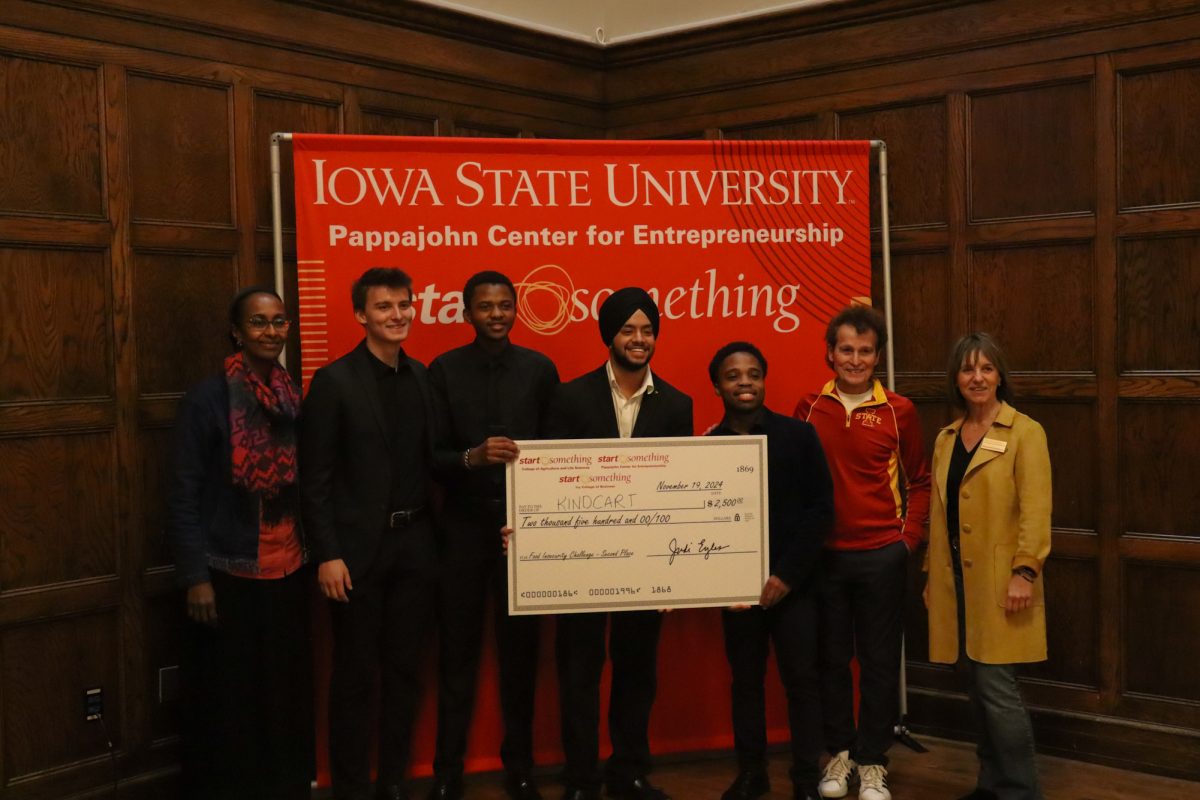Three teams were crowned in the Food Insecurity Challenge pitch-off competition Tuesday, with $9,000 in prizes awarded.
The challenge kicked off with a “Hunger Banquet” on Nov. 6, meant to showcase food inequities.
“The unfinished road is a call to action, a reminder of the work left to do,” assistant teaching professor Smaranda Andrews said during the kickoff. “But I am confident today, and I am optimistic. I see in this room the innovators, the problem-solvers and the compassionate leaders who will help pave the way to a future where no one goes hungry.”
The first-place winners of the challenge were Andrew Holtz, Antonio Reyes and Miguel Bojorquez with their “Cy’s Lockers” idea.
The goal of their idea was to get food to people who may feel stigmatized by going to food pantries. This would be done by food being ordered and delivered to a personal temperature-regulated locker. They hope to work with the engineering department at Iowa State to help develop the idea.
Holtz is proud that the work they did paid off.
“With it being a pretty long two weeks, it can be pretty daunting,” Holtz said. “I think that’s one of the top emotions that definitely comes up once you get to the stage. It’s the fact that that was two weeks of late nights, and really working hard on this really paid off.”
Bojorquez also admired the great ideas of their competitors.
“You have such [other competitive] great ideas,” Bojorquez said. “It’s kind of like everyone here is a winner. I wouldn’t say we obviously got first place, but I’d say everyone else here had great ideas, kind of like [what] Judi [Eyles] said: everyone here is a winner.”
Holtz says their journey to the top wasn’t a smooth one and they had some difficulties.
“There were definitely bumps in the road, and as we moved along, we were sure to check each other, so things would come up where all of a sudden we’re almost second-guessing ourselves,” Holtz said. “‘Is this even a good solution? Is it feasible? Are they gonna like it? Are we really solving any issues? Is the issue we’re solving big enough?’”
“At the end of the day, we almost have to reassure ourselves, so I think that was definitely a big issue that we came across, but we kind of got to ride the wave, and then we came out in the end,” Holtz said.
They also wished that all underclassmen would participate in the event.
“It’s such an incredible event where you’re given the opportunity to really shoot in the dark at a really tough issue where the right answer isn’t obvious, and the odds of you coming up with an absolute perfect solution is next to none because if that was the case, someone would have thought of it by now,” Holtz said.
“I think any student that’s not graduating that could be able to take advantage of this next year,” Holtz added. “[I] strongly, strongly encourage [them] to take part in the challenge and take advantage of this opportunity because it’s a lot of fun.”
“It makes you think, it makes you gather with other intelligent people that Iowa State University has and challenges [you] to think outside the box,” Reyes said.
Phila Thabang, Japneet Singh, Liam Willcox and Tadiwa Mbuwayesango take home second place and win $2,500, taken on November 19, 2024 in the Memorial Union, Ames, IA.
The second place winners were Phila Thabang, Japneet Singh, Liam Willcox and Tadiwa Mbuwayesango with their “Kindcart” idea.
After interviewing the president of an Ames food pantry, they learned that some elderly and disabled people found it difficult to get to a local food pantry. Their solution was to get people to deliver them food by calling their number or by visiting their website.
The third-place winners were Mallorie Mogler, Ellyse Shippee, Daniella Thuerauf and Grace Watkins-Schoenig with their “College Kitchen” idea.
Their goal was to add an exploratory three credit course to Iowa State’s curriculum that would have students research and learn about recipes on one day and cook those recipes on another. Not only would this be a way to get students credits, but it would also allow students who don’t have access to proper nutrition a way to consume them through nutrient-dense meals at a low price.
First place received a prize of $5,000. The second and third-place teams received $2,500 and $1,500, respectively. Resources for food insecurity can be found here.


